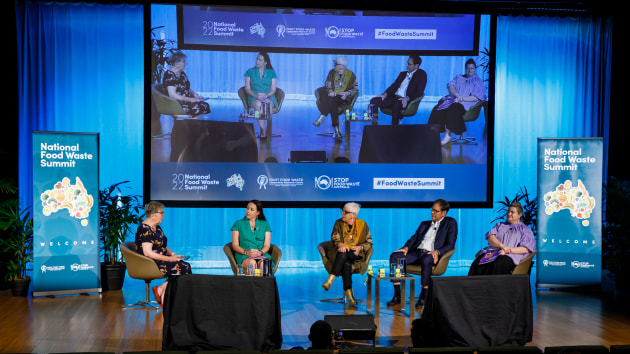Calls for a National Food Donation Tax Incentive have intensified this week with the release of a report outlining its design and implementation analysis at the National Food Waste Summit in Brisbane.
Food waste costs the Australian economy $36.6 billion every year, contributing three per cent of the country’s greenhouse gas emissions. At the same time, more than 300,000 households are receiving assistance from food relief organisations every day.
Foodbank Australia said of the 7.6 million tonnes of food wasted every year, 70 per cent is perfectly edible and could deliver a social return of $2 billion.

Brianna Casey, CEO, Foodbank; Ronni Kahn, CEO, OzHarvest; Steve Clifford, CEO, SecondBite;
Georgie Aley, National Sector Lead, Packaged Consumer Goods & Agribusiness, KPMG Australia.
In 2020, KPMG released a report into boosting food relief through the tax system, and since then has been consulting with industry stakeholders to determine the feasibility and potential effectiveness of the proposed tax incentive.
Interviews were conducted with 33 companies representing both national and local businesses along the whole food supply chain. What the process uncovered was overwhelming whole-of-sector support for the scheme, with companies passionate about the potential of the incentive to really shift the dial on redirecting surplus to food relief.
It recommends a two-tiered tax incentive based on the ability to offset a percentage of costs related to food donations from taxable income, with the aim to encourage food producers to donate surplus product to food relief rather than sending it to landfill.
KPMG developed the NFDTI model with the support of Foodbank and the Fight Food Waste Cooperative Research Centre (CRC) and the food relief sector.
Dr Steve Lapidge, CEO of Fight Food Waste CRC said the research and proposal show the power of collaboration.

“This research was led by one of Australia’s biggest financial organisations, KPMG, in conjunction with one of its biggest food relief organisations, Foodbank. To meet Australia’s goal of halving food waste by 2030, it’s partnerships like these, coordinated through the Fight Food Waste CRC, that will have the biggest impact not only on the amount of food we waste but just as importantly on the lives of millions of Australians who are food insecure,” said Lapidge.
Foodbank Australia CEO Brianna Casey said, “It is ludicrous that our tax system does not reward hard-working farmers and small business transporters who contribute invaluable products and services to food relief.
“We should be making it easier to donate rather than dump perfectly good produce that may not look quite right, and one of the ways we can do that it by making sensible changes to our tax system to incentivise food donation.”
She said that experience in the US, France, Canada and the Netherlands show that tax incentives are the most effective way to increase the redirection of food surplus to food relief.
“Australia has set itself an ambitious target of halving food waste by 2030, and with only seven years to go, we need the Australian government to take bold and decisive action, including the introduction of a National Food Donation Tax Incentive” Ms Casey said.
In addition to contributing to sustainability goals, the proposed incentives would provide support to small to medium enterprises – particularly farmers and small businesses – in transport and logistics, stimulating regional economies, and mitigating some of the economic impacts of labour shortages, natural disasters, and the cost-of-living crisis, Foodbank said.
Organisations supporting the incentive include, but not limited to:
- Australian Food & Grocery Council;
- National Farmer’s Federation;
- Country Women’s Association of Australia;
- National Retail Association;
- Australian Logistics Council;
- CHEP;
- Australian Trucking Association;
- Fight Food Waste Cooperative Research Centre;
- FIAL;
- Sydney Markets;
- Catholic Social Service Australia;
- Anglicare Australia;
- AUSVEG;
- Australian Institute of Food Science & Technology; and
- Central Coast Industry Connect.








